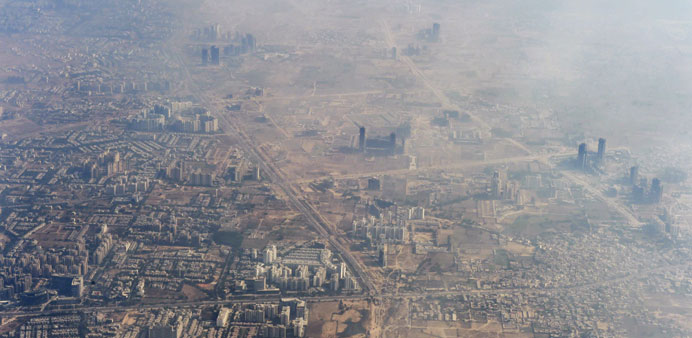Agencies/New Delhi
India’s polluted capital, New Delhi, will within two months impose a tax on commercial vehicles entering the city and prohibit the use of cars on certain busy routes once every month, its transport minister said yesterday.
High pollution levels have worried environmentalists, public and the authorities in the city of 16mn people, which the World Health Organisation last year said had the worst air quality in the world. India rejected the report’s findings.
Initiatives to clean up Delhi’s air have hit roadblocks in the past. A directive this year to ban all vehicles older than 15 years has been delayed and previous city governments have often ignored court orders to address pollution woes.
“Delhi’s pollution levels are rising beyond dangerous levels,” state Transport Minister Gopal Rai said. “If we don’t address this, people will be forced to think about leaving the city to save their lives.”
Rai said his government will within two months impose a surcharge of up to Rs1,300 ($20) on diesel-fuelled trucks that enter the city. For a longer-term solution, authorities are trying to build a peripheral road to divert traffic.
About 52,000 such vehicles enter the landlocked city each day, more than double government estimates, the Centre for Science and Environment (CSE) said in a report this week. Such vehicles account for about a third of the city’s pollution.
Acting on a petition from a lawyer, the Supreme Court on Monday gave Delhi Aam Aadmi Party government three days to devise a plan to address alarming levels of pollution caused specifically by commercial trucks. There have been several similar court orders in the last 15 years.
CSE’s executive director, Anumita Roychowdhury, welcomed Rai’s decision to levy a pollution tax, but said effective implementation was key.
“Implementation has to be really effective to act as a deterrent. The track record to deal with truck pollution has been bad,” Roychowdhury said.
“Travel through Delhi needs to be charged so that there is a clear disincentive for the use of these roads,” Roychowdhury said.
Harish Salve, the lawyer who filed the petition, said many of the trucks also only drove through Delhi to avoid paying tolls outside the city.
“This is a serious issue. We will take up this matter on Thursday. We want a positive response,” Chief Justice H L Dattu told the court on Monday.
Among other initiatives, starting October 22, Delhi will enforce a car-free day on certain routes once a month. Rai has also urged citizens to adopt a one-car-one-family policy and increase use of bicycles.
The government is also evaluating a proposal to introduce staggered office hours to decongest traffic in the city, where jams run into several hours at peak travel time.
A WHO study of 1,600 cities released last year showed Delhi had the world’s highest annual average concentration of small airborne particles known as PM2.5 - higher even than Beijing.
These extremely fine particles of less than 2.5 micrometres in diameter are linked to increased rates of chronic bronchitis, lung cancer and heart disease as they penetrate deep into the lungs and can pass into the bloodstream.
“It (Delhi) is not the dirtiest city,” Rai said, “but the problem is serious.”

In this photograph taken on November 25, 2014 smog envelops buildings on the outskirts of New Delhi.
